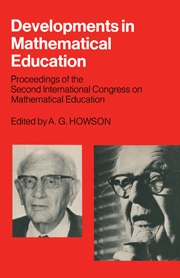 Developments in Mathematical Education
Developments in Mathematical Education Book contents
- Frontmatter
- Contents
- Editor's Acknowledgements
- PART I A CONGRESS SURVEY
- PART II THE INVITED PAPERS
- As I read them
- Comments on mathematical education
- The Presidential Address
- What groups mean in mathematics and what they should mean in mathematical education
- Nature, man and mathematics
- Some anthropological observations on number, time and common-sense
- Mathematical education in developing countries – some problems of teaching and learning
- Some questions of mathematical education in the USSR
- Modern mathematics: does it exist?
- PART III A SELECTION OF CONGRESS PAPERS
- Appendices
- Index
Some anthropological observations on number, time and common-sense
from PART II - THE INVITED PAPERS
- Frontmatter
- Contents
- Editor's Acknowledgements
- PART I A CONGRESS SURVEY
- PART II THE INVITED PAPERS
- As I read them
- Comments on mathematical education
- The Presidential Address
- What groups mean in mathematics and what they should mean in mathematical education
- Nature, man and mathematics
- Some anthropological observations on number, time and common-sense
- Mathematical education in developing countries – some problems of teaching and learning
- Some questions of mathematical education in the USSR
- Modern mathematics: does it exist?
- PART III A SELECTION OF CONGRESS PAPERS
- Appendices
- Index
Summary
In 1919, in his Introduction to Mathematical Philosophy, Bertrand Russell declared that ‘logic is concerned with the real world just as truly as zoology’, but in the Preface to the 1938 edition of The Principles of Mathematics we read that ‘none of the raw material of the world has smooth logical properties, but whatever appears to have such properties is constructed artificially to have them’. Fashions in social anthropology go through similar oscillations. During most of my academic lifetime the bias has been heavily empiricist. Anthropologists have supposed that they were engaged in a kind of social zoology. Human societies have been discussed as if they were organisms. The study of social structure and social relations has been treated as analogous to the study of anatomy and physiology. Anthropology was a social science; anthropologists hoped to discover an ordered universe of social facts – objective facts put there, free from the taint of human intuition.
Broadly speaking, empirically minded social anthropologists of this sort take the view that all unsophisticated pre-literate peoples have a thoroughly practical rule-of-thumb approach to the day-to-day problems of domestic technology. They insist that it is a complete mistake to imagine that the ordinary behaviour of primitive man is dominated by childish superstition. Magical fantasy is never allowed to interfere with common-sense.
- Type
- Chapter
- Information
- Developments in Mathematical EducationProceedings of the Second International Congress on Mathematical Education, pp. 136 - 153Publisher: Cambridge University PressPrint publication year: 1973
- 1
- Cited by
